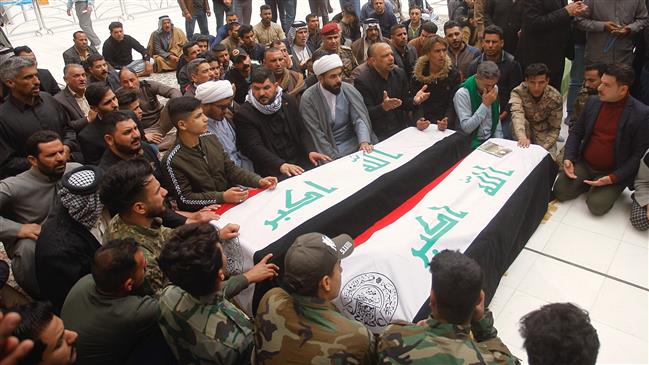Iraq lodges complaint with UNSC over Satanic US airstrikes
Iraq says it has lodged a formal complaint with the UN Security Council (UNSC) over a string of airstrikes carried out by the United States against multiple targets in the Arab country.

The spokesman for the Iraqi Ministry of Foreign Affairs, Ahmed al-Sahaf, said Tuesday that the ministry has sent two protest letters to the UNSC over the attacks, which targeted positions of the Iraqi army, police and Iraqi Popular Mobilization Units (PMU), better known by the Arabic name Hashd al-Sha’abi, on Thursday night.
He described the airstrikes as a “hostile act and a clear violation of the terms of US military presence” in Iraq.
The attacks killed three Iraqi soldiers, two police officers and a civilian worker, and damaged an unfinished civilian airport.
The Iraqi military says the US strikes amount to a targeted act of aggression against Iraq’s armed forces and a violation of its sovereignty.

Iraq calls in US, British envoys after multiple airstrikes on Hashd Sha’abi positionsIraq
On Friday, Baghdad summoned the US and British ambassadors to Baghdad over the aggression which “has clearly indicated repeated US violations against Iraq, its people and armed forces.”
That deadly attack was conducted hours after the US-led military coalition purportedly fighting the Daesh terror group announced that three of its personnel — two Americans and one Briton — had been killed in a rocket attack on Iraq’s Taji military camp, located some 30 kilometers (18.6 miles) north of Baghdad.

Iraq condemns US airstrikes; says soldiers, police, civilians killedThe Iraqi military and the presidency have condemned new US airstrikes, saying they killed soldiers, police officers and civilians Thursday night.
On Saturday, a second similar rocket attack on Taji wounded three US troops. The Iraqi military said several Iraqi air defense servicemen were also critically wounded.
A new group calling itself Assaba al-Thaerin claimed responsibility for the attack on Taji.
US President Donald Trump claimed that the attackers were a group that “most likely looked like it could be backed by Iran,” a claim rejected by Tehran as “baseless.”

In hawkish remarks, Pompeo threatens Iraq with more aggression ‘if US forces attacked’The US secretary of state has threatened the Iraqi government with more acts of aggression.
‘Rockets hit Iraqi base hosting foreign troops’
Meanwhile, Iraqi military said in a statement on Tuesday that a pair of rockets hit another Iraqi base hosting US-led coalition and NATO troops, marking the third such attack on installations hosting foreign forces within a week.
The rockets slammed into the Besmaya base south of Baghdad late Monday night, said the statement, which made no mention of casualties.
Spanish forces linked to the US-led coalition as well as NATO training forces are present in Besmaya.
Anti-American sentiment has been running high in Iraq following the assassination of Lieutenant General Qassem Soleimani, the commander of the Quds Force of the Islamic Revolution Guards Corps (IRGC), along with the deputy head of the PMU, Abu Mahdi al-Muhandis, and their companions in a US airstrike authorized by President Donald Trump near Baghdad International Airport on January 3.
The US, backed by Britain, invaded Iraq in 2003 claiming that the former regime of Saddam Hussein possessed weapons of mass destruction. No such weapons, however, were ever found.
The invaders withdrew from Iraq, after nearly nine years of a military campaign that cost tens of thousands of Iraqi lives.
A US-led military coalition, however, returned to the Arab country in 2014, when the Daesh Takfiri terrorist group unleashed a campaign of destruction there.
Widespread reports said the Washington-led operations largely spared the terrorists and led, instead, to civilian deaths and inflicted damage on the Iraqi infrastructure.
Iraq’s army troops, backed by volunteer forces, managed to liberate all Daesh-held areas, thanks in part to effective military advisory assistance from neighboring Iran.
Baghdad declared the end of the anti-Daesh campaign back in 2017.







